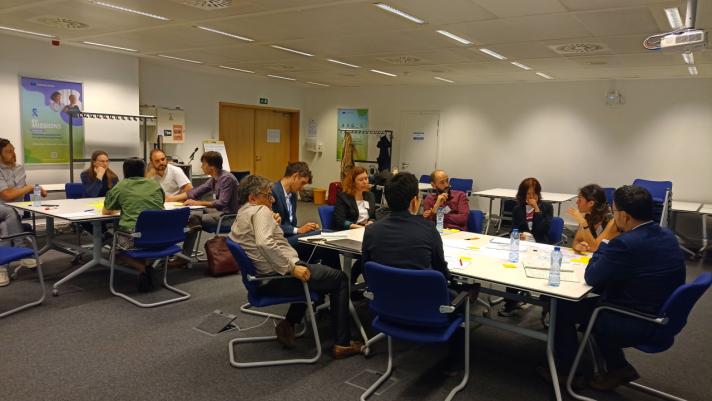The two communities of practice on ‘Industry-academia collaboration for knowledge valorisation’ and on ‘Citizen engagement for knowledge valorisation’ have submitted their recommendations to the European Commission in June 2023. Based on their work, an open stakeholder survey was conducted, which ended on 20 October 2023 and showed broad support for new Codes of Practice in these two areas. They are planned to be presented in spring 2024.
The two communities of practice were launched by the European Commission to co-create two new codes of practice. They started their work with the kick-off meetings on 29 March 2023.
Based on the contributions from the communities of practice, the Commission intends to develop two codes of practice, which will support the Council Recommendation on the guiding principles for knowledge valorisation by providing more detailed guidance on industry-academia collaboration and citizen engagement. The two codes are planned to be adopted as Commission Recommendations in the first quarter of 2024.
The communities comprised a wide variety of research and innovation (R&I) stakeholders that expressed their interest to contribute to these bottom-up initiatives. Since March, the members of the communities have been collaborating to provide inputs, analysis, and recommendations for the codes of practice. The work of the communities has been concluded with their final contributions.
Community of practice on industry-academia collaboration for knowledge valorisation
More than 210 participants from 25 EU Member States and 11 other countries joined the community of practice on industry-academia collaboration for knowledge valorisation. Members of the community represented a broad range of R&I stakeholders, including universities, public and private research organisations, large companies and SMEs, technology and knowledge transfer offices, umbrella associations, multi-stakeholder partnerships, civil society organisations and national or local authorities.
The contribution of the community of practice was collected through surveys and the members were involved in monthly meetings during which inputs on the key elements and recommendations for the code of practice were discussed.
The community of practice has identified crucial topics to be addressed by the code such as strategic approach to industry-academia collaboration, skills and culture, incentives, networking and communication and the role of intermediaries and facilitators, among others. The input by the community will serve as a sound basis for the development of the final recommendations by the Commission.
Should you have any question regarding this community of practice, please contact RTD-INDUSTRY-ACADEMIA-COP ec [dot] europa [dot] eu (RTD-INDUSTRY-ACADEMIA-COP[at]ec[dot]europa[dot]eu)
ec [dot] europa [dot] eu (RTD-INDUSTRY-ACADEMIA-COP[at]ec[dot]europa[dot]eu)
Community of practice on citizen engagement for knowledge valorisation
The community of practice on citizen engagement for knowledge valorisation was composed of more than 120 members from 21 EU Member States and 4 other countries. The members of the community of practice were affiliated to a diverse range of organisations linked to research and innovation. This includes universities, NGOs, private and public research organisation, private companies, multi-stakeholder partnerships, international organisations, umbrella associations, intermediaries, and national and regional authorities.
Since March, the community of practice met once a month to share experiences, discuss, and draft inputs that will feed into the code of practice on citizen engagement for knowledge valorisation. The input of the community of practice will serve as a sound basis for the development of the final recommendations by the Commission. The code will be a guiding document with principles, recommendations, and practical examples for stakeholders in support of their citizen and societal actor engagement activities in a knowledge valorisation context.
In addition, an exploratory expert workshop involving 13 independent experts in the field of citizen engagement for R&I and valorisation and Commission representatives took place on 9 June 2023 in Brussels. It was organised by a consortium led by the Centre for Industrial Studies (CSIL), which is also conducting a study on the topic for the European Commission (forthcoming).
The workshop aimed to discuss the ways in which involving citizens and the wider public can enhance value creation for society and market, and explore preliminary findings from a portfolio analysis of case studies and best practices. Throughout the workshop, participants delved into crucial questions regarding the conditions and the actors that enable successful citizen engagement models. Factors such as the engagement phase, the objectives pursued, and the stakeholders involved were taken into consideration. As a result of the workshop, participants identified actionable points for practitioners and co-drafted recommendations for policymakers, which will be further developed and validated in next stages of the study. The results of the study are expected to be published end of 2023.
If you have any questions regarding the work of this community of practice contacting: RTD-CITIZEN-ENGAGEMENT-COP ec [dot] europa [dot] eu (RTD-CITIZEN-ENGAGEMENT-COP[at]ec[dot]europa[dot]eu)
ec [dot] europa [dot] eu (RTD-CITIZEN-ENGAGEMENT-COP[at]ec[dot]europa[dot]eu)

